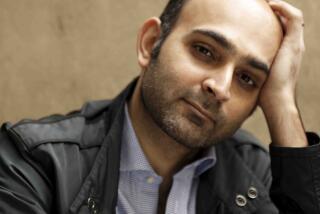Great men in the Great War
- Share via
Conventional wisdom has it that the United States entered World War I late, suffered much less than its French, British and Russian allies, defeated an already crumbling foe and emerged with most of the glory that could be gleaned from that least glorious of conflicts.
Jeff Shaara amends this view in his latest historical epic, “To the Last Man.” He points out that U.S. casualties from May to November 1918 nearly equaled those of 14 years in Vietnam; that Gen. John “Black Jack” Pershing had the advantages of fresh troops, high morale and bountiful munitions but had to make the same frontal assaults that had bled the other allies.
Such sacrifice was crucial, Shaara contends in the novel’s last sentence: “If the U.S. Army had not arrived when it did and had not fought the way it did, the Allies would have lost the war.”
Shaara has extended and altered the family war novel franchise that his father, Michael, began in 1974 with the Pulitzer Prize-winning “The Killer Angels,” the basis for the movie “Gettysburg.” Jeff Shaara has written two Civil War books (“Gods and Generals” and “The Last Full Measure”), two on the American Revolution (“Rise to Rebellion” and “The Glorious Cause”) and one on the Mexican War (“Gone for Soldiers”).
Though more prolific than his father, he is less the prose stylist -- less, in fact, the novelist. Among World War I fictions, “To the Last Man” can’t match Erich Maria Remarque’s “All Quiet on the Western Front,” Sebastian Faulks’ description of the Battle of the Somme in “Birdsong” or John Fowles’ chapter on Neuve Chapelle in “The Magus.”
He does excel as a popular historian. His account in “The Last Full Measure” of Gen. Ulysses S. Grant’s campaigns of 1864-65, for instance, is among the clearest we have, and he brings the same lucidity to this tale of the U.S. Expeditionary Force in 1917-18.
Shaara tells the story through the minds of actual participants. Marine Pvt. Roscoe Temple, a sharpshooting Florida farm boy, fights heroically but sees all his friends killed. Meanwhile, the ramrod-stiff Pershing, whom Shaara tries but mostly fails to humanize, carries out a prodigious task: He creates a million-man army almost from scratch, transports it to France, organizes it, trains it, fends off constant efforts by the British and French to break it into pieces to patch up their own armies and leads it to victory at Belleau Wood, Chateau-Thierry, St. Mihiel and the Meuse-Argonne.
Shaara’s other main characters are odd choices: Germany’s “Red Baron,” Manfred von Richthofen, and a French-born American ace of the Lafayette Escadrille, Raoul Lufbery. Their aerial exploits are stirring but tangential to the main action.
The first 200 pages of the novel aren’t much more than a prolonged throat-clearing, though once the United States finally enters the war, Shaara forges ahead as aggressively as Pershing did: with a barrage of heavy-caliber research to soften our resistance, followed by battalions of period detail brought to vivid life, swarming us under.
So what’s missing? The variety of human thought and feeling that a novel should offer. The defining points of view are all of leaders and heroes -- the sorrowful but unquestioning doughboy (Temple), professionals who regard war as the natural state of things (Pershing, who opposes the Armistice), people who relish war (George Patton, commanding tanks for the first time).
Shaara’s books, as a whole, have a triumphal ring that he may not have intended. They are paeans to the American fighting man, regardless of where or why he fought. And what a lot of fighting we have done.
Michael Harris is a regular contributor to Book Review.
More to Read
Sign up for our Book Club newsletter
Get the latest news, events and more from the Los Angeles Times Book Club, and help us get L.A. reading and talking.
You may occasionally receive promotional content from the Los Angeles Times.







